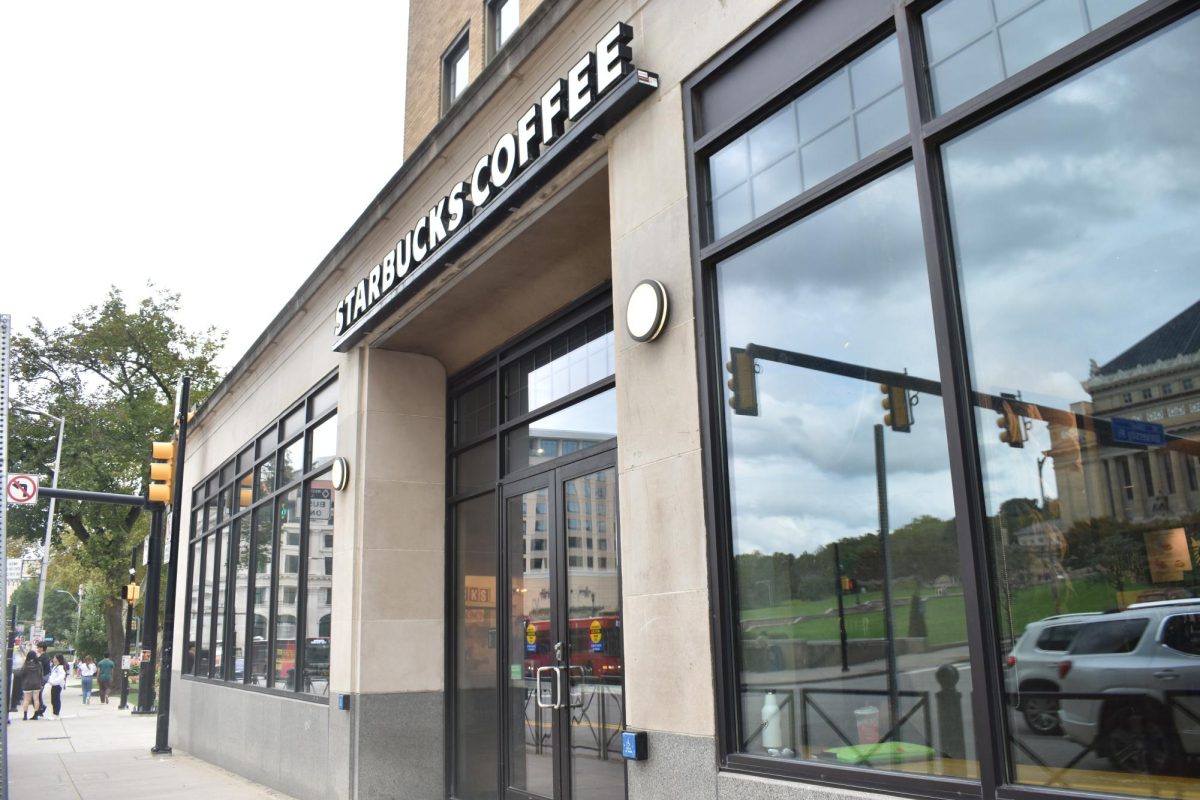The baristas at the Amos Hall Starbucks knew that August 24 would be especially busy, as it was both move-in day for Amos Hall and the launch of Starbucks’ fall menu. That’s exactly why they chose that day to strike.
Their labor union, Workers United, ensured that the workers received strike pay for the single day that they were on strike. The next day they returned to work.
“We specifically chose that day to say, ‘Okay, well, if you’re gonna scab and you want to prove that you can do our jobs, do it,’” Cas Borowitz, a barista and strike captain at the Amos Hall Starbucks, said.
Managers opened the store anyway and staffed it with other managers from local Starbucks locations. But according to barista Lillian Brewington, this made for a “terrible launch day.”
“They had a full staff of managers and everything there, but there was still a major wait,” Brewington said. “They broke the front door that had just been fixed because they kept trying to prop it open…They didn’t know how to shut down the espresso machines, so those were messed up for hours the next day.”
According to Borowitz, the managers fell about an hour behind on mobile orders as well.
Borowitz said the strike was the Amos Hall Starbucks employees’ response to “management’s dismissive attitude and general disrespect.”
At the end of July, new management took over at the Amos Hall location. According to Brewington, these new managers “brought a lot of changes” to the store, without listening to the objections of employees.
“Amos Hall runs differently from other Starbucks [stores] because of how busy we get…You can’t do the same things that you do at other places to pick up the workload, and one of those things is hours,” Brewington said. “They’ve been cutting hours pretty massively for most of our partners, and one of the ways that they’ve been doing that is scheduling us just under six hours a shift… And they’ve openly told us that they’re doing that so they don’t have to run breaks.”
According to Amos Hall baristas and strike captains Borowitz and Haven Bowman, they and their fellow baristas attempted multiple times to voice their concerns to their managers prior to the strike.
“They seemed really comfortable with how the store was in the summer when it’s super slow…We were voicing our concerns that they were getting way too comfortable,” Borowitz said.
This included concerns regarding staffing shortages, scheduling issues and Starbucks and OSHA policy violations such as asking sick baristas to stay at work. But they said the new managers disregarded their employees’ concerns, even when creating the work schedules for Pitt’s orientation week.
“We were all like, ‘this is severely understaffed, this would be properly staffed if we were still doing the summer numbers, but we are severely understaffed for the business that we’re about to receive,’” Borowitz said. “And we were basically just told, ‘Well, we can’t go over labor.’”
According to Borowitz, managers are allotted a certain number of working hours per week for them to distribute amongst the baristas.
“So, when someone says we need to be under labor, it’s actually because management gets a pay increase whenever they keep the labor low and the numbers high for sales,” they said.
In an email response to a request for comment, a Starbucks spokesperson addressed some of the allegations.
“The Amos Hall store is fully staffed,” the spokesperson said. “Notably, management actively recruited and hired to support an expected increase in customer demand driven by return to school.”
Brewington said she found this answer “misleading.”
“It doesn’t matter how many workers you have if you don’t use and staff those workers properly,” Brewington said.
On the day of the strike, the Pittsburgh Starbucks Workers United X account posted pictures of the picketing baristas.
“Today, Starbucks workers at the Amos Hall and Eastside locations are on strike! There has been a series of unjust disciplinary actions happening across Pittsburgh recently. With rampant favoritism and understaffing at our stores, these workers took to the streets!”
Borowitz said the “unjust disciplinary actions” referred to in the post was the firing of four Starbucks baristas in 2022 who were involved in unionizing efforts: James Green, Brett Taborelli, Kimberly Manfre and Victoria Tambellini.
A June 30, 2023, ruling by National Labor Relations Board administrative law judge Robert Ringler found the firings to be illegal and ordered Starbucks to reinstate the four baristas. As of September 11, at least one of the four fired workers has returned to work, according to a Pittsburgh Starbucks Workers United Instagram post.
Since Amos Hall Starbucks workers joined Workers United in May 2022, several other Pittsburgh Starbucks locations have also successfully unionized.
The Starbucks spokesperson also said while they “respect [their] partners’ right to engage in protest activities,” bargaining representatives from Workers United, the union representing the Amos Hall Starbucks employees, have “consistently failed to show up” for Starbucks employees.
“In fact, Workers United has only met Starbucks in-person to progress negotiations for 10 stores over the past two years,” the spokesperson said.
Brewington, who says she attended a meeting a few months ago with Starbucks Workers United representatives and Starbucks lawyers, also took issue with this comment.
“They’re the ones who don’t listen. We met up with them and we had our papers which have our demands, what we’re asking for, to bargain with,” Brewington said. “And they didn’t even read the document.”
Borowitz hoped that the strike would motivate management to listen to the baristas. However, since a promotional buy one, get one deal on September 7, Borowitz is still concerned.
“We had a store record of business with a 500-plus drink half an hour and all our bars being backed up by an hour with only six people on the floor,” Borowitz said. “Once again, we were not properly staffed at all or treated with any respect throughout.”


